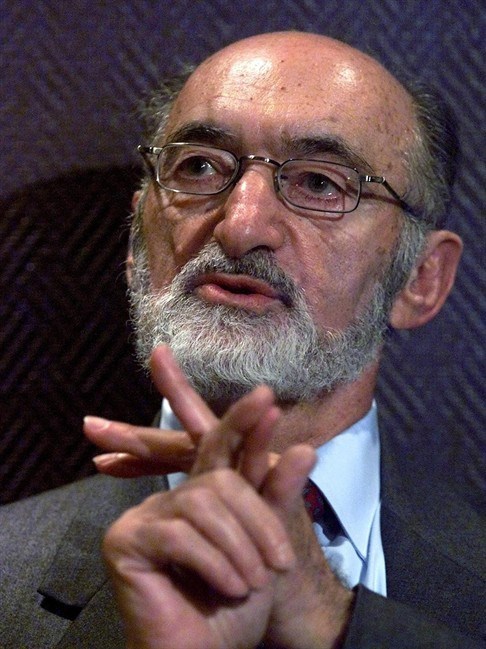OTTAWA - Canadians don't want to revisit the age-old abortion debate, sa���ʴ�ý's minister for the status of women said Monday as activists on both sides marked 25 years since the Supreme Court's landmark decision on the issue.
Rona Ambrose was responding to a question from the NDP's Niki Ashton, the party's status of women critic, when she borrowed a line from outgoing U.S. Secretary of State Hillary Clinton.
"Stealing a quote from someone I admire very much, Hillary Clinton, I believe abortion should be safe, legal and rare," Ambrose said during question period.
"This is an issue that women are not interested in debating."
Earlier Monday, at a news conference to mark the anniversary, Ashton dusted off what was once a commonly heard refrain when it came to the Harper Conservatives: they harbour a secret desire to ban abortion.
"The Conservative government has veiled its attempts time and time again to roll back women’s reproductive rights," she said.
"Despite the prime minister’s statements that he would not re-open the abortion debate, backbench MPs on a number of occasions ... have put forward motions with the support of high-profile ministers that have aimed to do just that: re-open the abortion debate."
The most prominent of those was an unsuccessful motion last year by backbench MP Stephen Woodworth, which called for a committee to explore the question of when life begins, in the context of its definition within the Criminal Code.
Even though it's been 25 years since the Supreme Court declared in 1988 that the country's ban on abortion was a violation of women's rights, many Canadians still can't access the procedure because they live too far from clinics, she added.
"There are parts of the country, like P.E.I., where women cannot get an abortion, and in New Brunswick where it’s heavily restricted," she said. "And obviously for rural women across sa���ʴ�ý, accessing reproductive services is a real challenge."
Ashton cited an online Angus Reid poll released over the weekend in which 60 per cent of respondents said they don't want the abortion debate reopened.
The same percentage, however, expressed support for a ban on gender-based abortion, Ashton noted. "People are very concerned," she said, while refusing to say whether the NDP would support such a law.
The landmark 1988 decision revolved around controversial Toronto doctor Henry Morgentaler, who had been providing abortion services to women since the 1960s — and constantly running afoul of the law in the process.
In 1983, a year after the Charter of Rights came into being, he and three colleagues opened an abortion clinic in Toronto and were promptly arrested.
At the time, the only way a woman could have an abortion was in hospital and after the approval of a committee of doctors. Not fair, the Supreme Court said.
"Forcing a woman, by threat of criminal sanction, to carry a fetus to term unless she meets certain criteria unrelated to her own priorities and aspirations, is a profound interference with a woman's body and thus an infringement of security of the person," wrote Chief Justice Brian Dickson and Justice Antonio Lamer in their opinion.
The Progressive Conservative government of the day tried to pass new laws after the court's decision, but none made it through Parliament. To this day, there exists no enforceable legislation in sa���ʴ�ý on the issue.
"We're the only democratic country in the world that has no abortion laws or restrictions against abortion and it's been 25 years since we've had no law," said Joyce Arthur, executive director of the Abortion Rights Coalition of sa���ʴ�ý.
"Going 25 years without a law, without having the sky fall in, is proof we don't need a law."
Since the decision, more than 30 abortion clinics have opened across the country, expanding access significantly, although some barriers remain for women living in rural areas or the North.
The Canadian Institute for Health Information says at least 64,000 abortions were performed in sa���ʴ�ý in 2010, the most recent year for which information is available.
Those numbers do not include abortions performed in Quebec, while other provincial totals are incomplete as a result of the way abortions are reported in certain provinces, the institute noted.
For the Campaign for Life Coalition, the numbers mean the anniversary is no time to celebrate.
"It's an opportunity to be ashamed of where we are in our country," said Mary Ellen Douglas, a national organizer with the group.
Douglas, an anti-abortion activist for more than 40 years, said while new technologies have made getting the message out easier, the ultimate goal — overturning the high court ruling — has never changed. Reaching it remains simply a matter of time and political will.
"We work to find people to run for the government, as well as to support them and get them elected, and hopefully, eventually we will have a law that will protect all human life from the moment of conception," Douglas said.
Arthur said she feared the worst when Woodworth's motion was tabled, but was relieved when Prime Minister Stephen Harper declared — as he has done many times — that the Conservatives would not rekindle the debate.
"I think the thing is that Harper is pragmatic," Arthur said. "He knows that abortion politically is a losing issue."
Anti-abortion advocates, meanwhile, were gratified to see Woodworth's motion. Douglas, for one, said she laments that Canadians in general seem terrified at the prospect of confronting one of humanity's most vexing questions.
"It seems really strange that in a country like sa���ʴ�ý we should put our head in the sand with something going on, on any issue, and not bother to find out about it."


